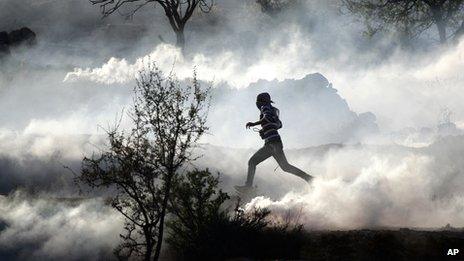BBC reporters on Israel-Gaza violence
- Published

As violence continues in southern Israel and the Gaza Strip after Wednesday's killing by Israel of the Hamas military leader Ahmed Jabari, BBC correspondents around the region and in London have been analysing and bearing witness to the unfolding events.
Jeremy Bowen, Middle East Editor
The danger of the kind of operation Israel has started is that rising casualties on both sides cause a violent escalation that neither side can control. If that happens it could cause a much bigger crisis across the Middle East.
At the moment Israel seems to be calculating that it can damage Hamas without the all-out attacks - and the international condemnation - it faced during the winter war of 2008/2009 in Gaza. Hamas threatens terrible vengeance. But it's hugely outgunned by the Israeli military.
As expected, Israel is being supported from the United States - despite the poor relationship between Prime Minister Benjamin Netanyahu and President Barack Obama. Even so, the White House will not want a long and bloody episode in and around Gaza, at a time when the entire Middle East is uncertain and unstable.
The Americans used to turn to former President Hosni Mubarak of Egypt to push the Palestinians towards a ceasefire. They've lost an ally they - and the Israelis - used to trust above any other Arab leader.
Egypt's current President Mohammad Mursi cannot ignore Egyptian rage at Israel's actions - nor would he want to. Hamas is an offshoot of the Muslim Brotherhood, of which he is a leader. The Brotherhood is cautious. But its presence in power in Egypt will reassure the leaders of Hamas that they are not alone.
Wyre Davies in Gaza
The overwhelming mood in Gaza is sombre but vengeful. Sombre because few here want another war with Israel - another war in which civilians would undoubtedly suffer as much as the fighters.
But there's anger too. The thousands of mainly young men who carried the body of Ahmed Jabari aloft through the streets of Gaza cried that his death, his assassination could not go unavenged.
And therein lies Israel's problem. Every time it hits back at Hamas and the other militants who fire volleys of rockets from Gaza they seem to recruit more fighters and lay their hands on more rockets, smuggled in through the tunnels from Egypt.
Israel has already threatened all Hamas operatives, junior and senior, to keep their heads down and stay off the streets. But such threats fall on deaf ears in this febrile atmosphere.
The main Hamas leaders were conspicuously absent during the public funeral. But even as the body of Hamas's military commander was being put in the ground, hundreds of rockets were launched towards Israel - three Israelis killed and 15 Palestinians, half of them civilians. A familiar cycle continues.
Yolande Knell in Kiryat Malachi
Sirens continued to wail at regular intervals in southern Israeli towns like Kiryat Malachi, sending residents rushing for cover. Usually when rockets fired from Gaza are heading for a populated area we see interceptor missiles fired by Israel's Iron Dome batteries - there are loud booms overhead and vapour trails cross-cross the sky.
But earlier one rocket did hit a building here. There is a gaping hole on the top floor of an old four-storey apartment building where two Israeli families were living.
A resident, Yerumichael Simon, told me: "I live across the street and I used to live inside that building. We grew up together. It's very hard for me to think about what happened. At eight in the morning we heard the alarm and a big boom. When I went outside I saw the big hole."